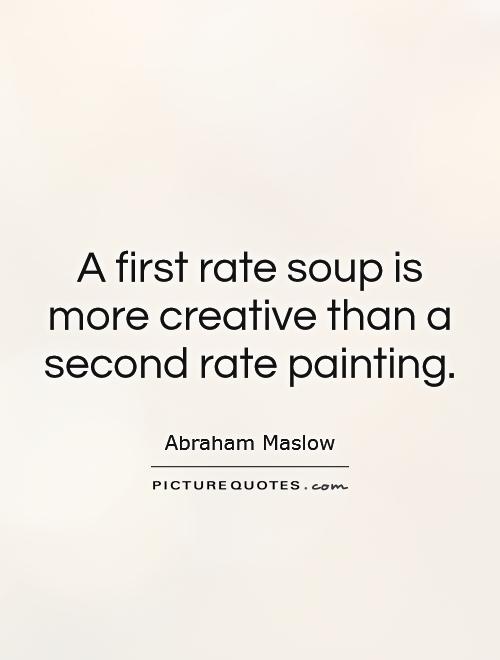A first rate soup is more creative than a second rate painting

A first rate soup is more creative than a second rate painting
Abraham Maslow, a renowned psychologist known for his hierarchy of needs theory, believed that creativity is a fundamental aspect of human nature. He argued that individuals have an innate drive to express themselves creatively, whether it be through art, music, writing, or even cooking. Maslow believed that creativity is a key component of self-actualization, the highest level of his hierarchy of needs.In the context of Maslow's theory, the statement "A first rate soup is more creative than a second rate painting" can be interpreted as emphasizing the importance of creativity in all aspects of life, not just in traditional forms of art. Maslow believed that creativity is not limited to the realm of painting or sculpture, but can be found in everyday activities such as cooking. In fact, Maslow argued that creativity is essential for personal growth and fulfillment, and that individuals who are able to express themselves creatively are more likely to achieve self-actualization.
When we consider the statement in relation to Maslow's theory, we can see that a first rate soup represents a form of creative expression that is both practical and nourishing. Cooking a delicious and well-crafted soup requires a certain level of skill, imagination, and attention to detail. A chef who is able to create a first rate soup is demonstrating their creativity and passion for their craft. In this sense, a first rate soup can be seen as a reflection of the chef's self-actualization, their ability to fully realize their potential and express themselves through their cooking.
On the other hand, a second rate painting may lack the creativity and originality that is necessary for self-actualization. A painting that is poorly executed or lacks inspiration may not fully engage the viewer or evoke any meaningful emotions. In Maslow's view, true creativity comes from a place of authenticity and passion, and is not simply a matter of technical skill or proficiency.












 Friendship Quotes
Friendship Quotes Love Quotes
Love Quotes Life Quotes
Life Quotes Funny Quotes
Funny Quotes Motivational Quotes
Motivational Quotes Inspirational Quotes
Inspirational Quotes